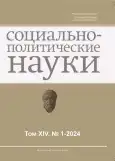Orthodoxy as an extra-linguistic phenomenon and the paradoxes of finding compliance with its linguistic images in publications of the 18th century (based on materials from the National Corpus of the Russian Language)
- 作者: Markova N.M.1, Arinin E.I.1, Golenko V.V.1
-
隶属关系:
- Vladimir State University named after Alexander and Nikolay Stoletovs
- 期: 卷 14, 编号 1 (2024)
- 页面: 122-131
- 栏目: Philosophy of religion and religious studies
- URL: https://journals.eco-vector.com/2223-0092/article/view/630638
- EDN: https://elibrary.ru/DAOPXJ
- ID: 630638
如何引用文章
详细
The “Dictionary of the Russian Language of the 11th–17th Centuries” states that the noun “Orthodoxy” has been found in Russian texts since the 13th (1246), and the adjective “Orthodox” since the 11th (1076) centuries. The linguistic academic resource “National Corpus of the Russian Language” shows the presence of 2.327 texts, of which only 29 publications (1.3%) account for the entire 18th century, some of which we consider in this text. The term “Orthodoxy” did not act as a unique confessional name denoting the state “right faith” of the country in the 11th–20th centuries, since a number of terms were used in this role, including the term “faith of the Greek-Russian confession”, popular in publications of the 18th century, which was included in the Code of Laws of the Russian Federation empire (1830), but as one of the epithets that emphasized the “correct faith” of the authorities (prince, tsar, emperor) and the majority of the people in a multi-confessional country of the Age of Enlightenment. The article outlines the position and approaches of modern philosophical religious studies.
全文:
作者简介
Natalia Markova
Vladimir State University named after Alexander and Nikolay Stoletovs
编辑信件的主要联系方式.
Email: natmarkova@list.ru
Scopus 作者 ID: 57209426026
Cand. Sci. (Philos.), Associate Professor; Associate Professor, Department of Philosophy and Religious Studies
俄罗斯联邦, VladimirEvgeni Arinin
Vladimir State University named after Alexander and Nikolay Stoletovs
Email: eiarinin@mail.ru
Scopus 作者 ID: 37060239800
Dr. Sci. (Philos.), Professor; Head, Department of Philosophy and Religious Studies
俄罗斯联邦, VladimirVladimir Golenko
Vladimir State University named after Alexander and Nikolay Stoletovs
Email: volodimir.golenko@mail.ru
Applicant, Department of Philosophy and Religious Studies
俄罗斯联邦, Vladimir参考
- Anichkov D.S. Reasoning from natural theology about the beginning and occurrence of natural worship of God. Moscow: Imperial Moscow University, 1769. 24 p.
- Arinin E.I. A.A. Zinoviev: Vernacular theology of the “believing atheist” (religious analysis). Humanitarian Gazette of the TSPU named after L.N. Tolstoy. 2022. No. 4 (44). Pp. 62–72. (In Rus.)
- Belyakova E.V. The first experiments in Russian church historiography. In: Facts and signs. Studies on the semiotics of history. Issue 1. Moscow: Languages of Slavic Cultures, 2008. Pp. 208–224.
- Golenko V.V. Ideas about Orthodoxy in Russian literature of the first half of the 18th century (based on materials from the NKR). In: Church, state and society in the history of Russia and Orthodox countries: Religion, science and education. Vladimir: VlGU Publishing House, 2023. Pp. 50–54.
- Golenko V.V. Ideas about Orthodoxy in Russian literature of the second half of the 18th century (based on materials from the NKR). In: Religion, science and theology: challenges and problems of our time. Vladimir: VlSU Publishing House, 2023. Vol. 39. Pp. 38–43.
- Kaariainen K., Furman D.E. Believers, atheists and others (the evolution of Russian religiosity). Questions of Philosophy. 1997. No. 6. Pp. 35–52. (In Rus.)
- Khan N.R. Papo-Caesarism and Caesaropapism as mechanisms of action of Christian theocracy. Bulletin of the Kyrgyz-Russian Slavic University. 2016. Vol. 16. No. 6. Pp. 194–198. (In Rus.)
- Manik S.A. Conditionality of the vocabulary of socio-political life by extralinguistic factors. Bulletin of Ivanovo State University. Series: Humanities. 2013. No. 1 (13). Pp. 71–74. (In Rus.)
- Novikov N.I. Experience of a historical dictionary about Russian writers, Nikolai Novikov collected from various printed and handwritten books, reported news and verbal legends. St. Petersburg: Printing house of the Academy of Sciences, 1772. 264 p.
- Poincaré A. Last thoughts. Petrograd: Red Printer, 1923. 133 p.
- Postovalova V.I. Theolinguistics in modern humanitarian knowledge: Origins, main ideas and directions. Scientific and Pedagogical Journal of Eastern Siberia Magister Dixit. 2012. No. 4. Pp. 54–101. (In Rus.)
- Seleznev M.G. The Hebrew text of the Bible and the Septuagint: Two originals, two translations? In: Materials of the XVIII Annual Theological Conference of PSTGU. Vol. I. Moscow: PSTGU Publishing House, 2008. Pp. 56–61.
- Shakhnovich M.M. Essays on the history of religious studies. St. Petersburg: St. Petersburg State University, 2006. 290 p.
- Verkhovskoy P.V. Establishment of the Spiritual College and “Spiritual Regulations”. Vol. 2. Rostov on Don: Type. M.I. Guzman, 1916. 686 p.
补充文件








